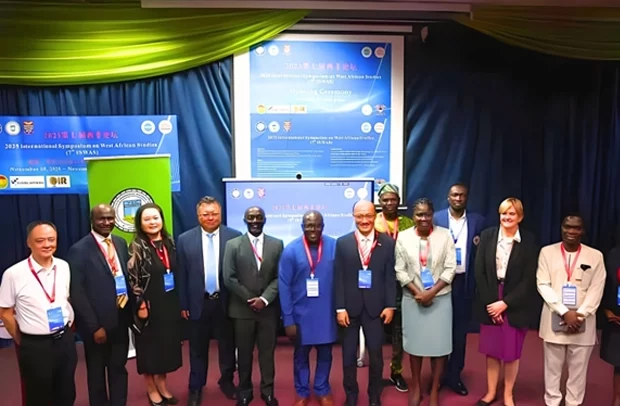Officials at the event
The 7th International Symposium on West African Studies (ISWAS) opened on Wednesday, November 19, 2025 at the Ghana Institute of Management and Public Administration (GIMPA) with a mandate that extended beyond typical academic discourse.
In a series of high-level deliberations, diplomats and scholars laid out a concrete roadmap for how Artificial Intelligence (AI) must move from a buzzword to a driver of Equity, Empowerment, and Resilience across the West African region.
The symposium, themed, “Sustainable Economic and Social Development in West Africa: AI Empowerment and Innovation,” is a tripartite collaboration between the University of Electronic Science and Technology of China (UESTC), GIMPA, and the University of Cape Coast (UCC).
Delivering a keynote that bridged diplomacy and hard economics, Chinese Ambassador to Ghana, Tong Defa, mentioned that the value of AI lies in its application to Ghana’s real economy. He called on the delegation to visualize a near future where digital infrastructure fundamentally alters national output
Ambassador Defa framed these proposals within the broader context of the recent FOCAC Summit in Beijing and the upcoming “China-Africa Year of People-to-People Exchanges.” He pledged China’s commitment to helping developing nations bridge the intelligent divide, ensuring that West Africa secures a distinct voice and representation in the global governance of AI.
Rector of GIMPA, Prof. Samuel Kwaku Bonsu, recalled the inaugural ISWAS at UCC in 2017 and the subsequent Smart City themed event at UESTC in China. He emphasized that the partnership between GIMPA and UESTC has transcended academic exchange to become a bond for cultural integration.
“For the West African region, artificial intelligence holds enormous potential and is expected to become a key driving force for achieving sustainable development goals. We also hope that this seminar can further promote capacity building and cooperation, inspire profound reflection and action, and bring greater and more positive impacts to our institutions, countries, and even the entire West African region,” Prof Bonsu stated.
On behalf of the Acting Vice-Chancellor of the University of Cape Coast, Professor Rosemond Boohene, a former Pro-Vice Chancellor of UCC, cautioned against adopting technology solely for speed.
She also highlighted that for the region to overcome challenges like climate vulnerability and educational gaps; the demographic dividend of West Africa’s youth must be armed with high-level digital skills.
“As artificial intelligence reshapes industries, governance, and social systems, West Africa must position itself not only as a participant but as a leader, this symposium offers a unique platform to explore how AI can be leveraged not just as a tool of efficiency, but as a catalyst for equity, empowerment, and resilience,” she added.
Director of the Center for West African Studies at UESTC, Prof. Shurong Zhao, outlined the symposium’s rigorous academic agenda.
She noted that the 7th International Symposium on West African Studies conference will generate many new ideas and innovative technologies, which can also be applied to different societies based on their political and historical backgrounds.
She outlined findings from a high-impact research work that pointed out some risks in E-Business Cooperation between China and West Africa and how they can be addressed.
A Daily Guide Report


